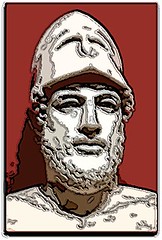AP World History: Chapter 5 (Mr. Arns) Flashcards
Terms : Hide Images [1]
| 10965586191 | Wang Mang | a high court official of the Han Dynasty who usurped the emperor's throne in 8 c.e. and immediately launched a series of startling reforms, such as redistributing land and providing financial assistance to peasants. |  | 0 |
| 10965586193 | Yellow Turban Rebellion | A peasant revolt starting in 184 c.e. named for the yellow scarves the peasants wore on their head, unifying ideology of Daoism, goal of "Great Peace" a golden age of equality and harmony; the revolt was sparked by landlessness and poverty. |  | 1 |
| 10965586194 | Varna | four social classes in India, relating to Caste system |  | 2 |
| 10965586195 | Jati | divisions within the varna, groups of similar people, sub-caste |  | 3 |
| 10965586196 | Ritual Purity | In Indian social practice, the idea that members of higher castes must adhere to strict regulations limiting or forbidding their contact with objects and members of lower castes to preserve their own caste standing and their relationship with the gods. |  | 4 |
| 10965586197 | Greek and Roman Slavery | In the Greek and Roman world, slaves were captives from war and piracy (and their descendants), abandoned children, and the victims of long-distance trade; manumission was common. Among the Greeks, household service was the most common form of slavery, but in parts of the Roman state, thousands of slaves were employed under brutal conditions in the mines and on great plantations. The Greco-Roman world relied more heavily on slaves than eastern civilizations did. |  | 5 |
| 10965586198 | Spartacus | A Roman gladiator who led the most serious slave revolt in Roman history from 73 to 71 B.C.E.) |  | 6 |
| 10965586199 | The Three Obediences | In Chinese Confucian thought, the notion that a woman is permanently subordinate to male control: first to her father, then to her husband, and finally to her son |  | 7 |
| 10965586201 | Empress Wu | The only female "emperor" in Chinese history (r. 690-705 C.E.), Empress Wu patronized scholarship, worked to elevate the position of women, and provoked a backlash of Confucian misogynist invective. |  | 8 |
| 10965586202 | Aspasia | A foreign woman resident in Athens (ca. 470-400 B.C.E.) and partner of the statesman Pericles who was famed for her learning and wit. |  | 9 |
| 10965586203 | Pericles | A prominent and influential statesman of ancient Athens (ca. 495-429 B.C.E.), he presided over Athens's Golden Age |  | 10 |
| 10965586204 | Helots | The dependent, semi-enslaved class of ancient Sparta whose social discontent prompted the militarization of Spartan society |  | 11 |
| 10965586211 | latifundia | Huge estates operated by slave labor that flourished in parts of the Roman Empire | 12 | |
| 10965586212 | scholar-gentry class | A term used to describe members of China's landowning families, reflecting their wealth from the land and the privilege that they derived as government officials. | 13 | |
| 10965621060 | patriarchy | A form of social organization in which males dominate females | 14 | |
| 10965625620 | artisan | A skilled craftsperson | 15 | |
| 10965626746 | Aristocracy | A government in which power is in the hands of a hereditary ruling class or nobility | 16 | |
| 10978159276 | Caste | any of the hereditary social classes in Hindu society; social stratification | 17 |
